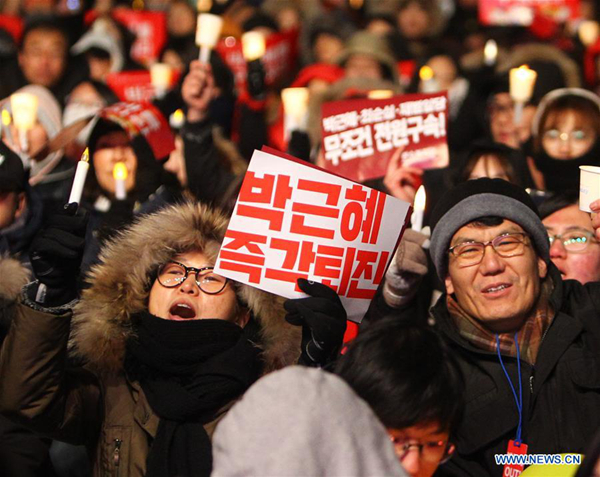ROK after the impeachment of Park
china.org.cn / chinagate.cn by George N. Tzogopoulos, December 16, 2016 Adjust font size:
|
|
|
Protesters hold slogans during a rally against South Korean President Park Geun-hye in central Seoul, South Korea Dec. 10, 2016. (Xinhua/Yao Qilin) |
For a politician to be successful and inspiring, the virtue of honesty is critically important. A leader should be a model for society and its citizens. South Korean President Park Geun-hye decided to follow a different way. In October 2016 she was accused of letting old family friend Choi Soon-sil become involved in several government affairs. Prosecutors started to investigate the case, and hundreds of thousands of people subsequently marched against her. As a result of Park's unwillingness to resign, the South Korean National Assembly voted overwhelmingly by a margin of 234-56 on a motion to impeach her.
The current period is transitory for South Korean politics. Prime Minister Hwang Kyo-ahn will be the acting president until the Constitutional Court renders its judgment. A new presidential election is a likely outcome, but no scenario should be definitively excluded. In a relevant case 12 years ago, the court overturned the decision of the National Assembly, allowing Roh Moo-hyun to return to power.
But the current situation seems different, not only because the charges are more solid but also because so many people actively demonstrated against her.
Until the judgment is announced, domestic politics will be relatively fragile. Although an acting president, Hwang will principally have administrative duties due to his limited support by the opposition. Expectations are low for Hwang's interim administration to be a breakthrough against problems such as unemployment and slowing economic growth. Above all, he is widely regarded as a loyalist of Park.
During Hwang's tenure, it will perhaps be more interesting to observe how the South Korean political landscape will be shaped and whether transparency will play a bigger role. Old politicians will seek political alliances in view of the early presidential election and new ones will test their chances. Additionally, figures such as former UN Secretary General Ban Ki-moon will possibly return to the domestic political scene. A recent poll shows that former chairman of the main opposition Democratic Party of Korea Moon-Jae-in and Ban Ki-moon come first with 20 percent.
As far as foreign policy is concerned, three main issues are on the agenda. The first is the evolution of the relationship between Seoul and Pyongyang. Some American analysts predict that the former will be more vulnerable to the latter during the ongoing interim period. Nonetheless, Hwang is aligned with Park's security strategy on the matter. It is not a coincidence that one of his first moves was to bolster readiness for a possible provocation by North Korea. His lack of a mandate to adopt new foreign policy initiatives does not mean that his power of maintenance is limited. From another perspective, North Korea will possibly keep a wait-and-see stance until Donald Trump clarifies his policy vis-à-vis the country.
The second theme is the future course of bilateral relations between South Korea and the U.S. Park had closely cooperated with Barack Obama. Specifically, under Washington's pressure, Seoul agreed with the deployment of the Terminal High Altitude Area Defense (THAAD) system. Hwang will not alter Park's commitment.
It is unclear how Trump will approach South Korea. In his election campaign he seemed rather ignorant of Washington's traditional partnership with Seoul but in a recent phone-call with Park he pledged to keep the existing security alliance. All in all, U.S. journals such as The American Interest talk about Trump's dilemma in relation to THAAD.
The third issue, which is closely linked to the second one, is the impact of South Korean politics on relations between Seoul and Beijing. Only a few days ago, the Democratic Party of Korea urged the government of the country to reconsider the deployment of THAAD. Although a reserved stance is required, China will certainly welcome such a stance by a new government of South Korea, especially if it comes during a period of indecisiveness by Trump on the matter.
Before long-term policies are examined, however, attention should also be turned towards current developments in Asia. On the initiative of Tokyo, the trilateral summit between Japan, China and South Korea scheduled for December 19 has been postponed for 2017. The domestic turmoil in South Korea is widely regarded as the reason for the decision. Perhaps Tokyo is also concerned by the position of the South Korean opposition party against the bilateral exchange of military intelligence and the issue of wartime "comfort women." Of course, all these factors should not prevent the functioning of a good communication mechanism like the trilateral summit. South Korea can have a future after Park.
George N. Tzogopoulos is a columnist with China.org.cn. For more information please visit:
http://www.china.org.cn/opinion/GeorgeNTzogopoulos.htm
Opinion articles reflect the views of their authors, not necessarily those of China.org.cn.
